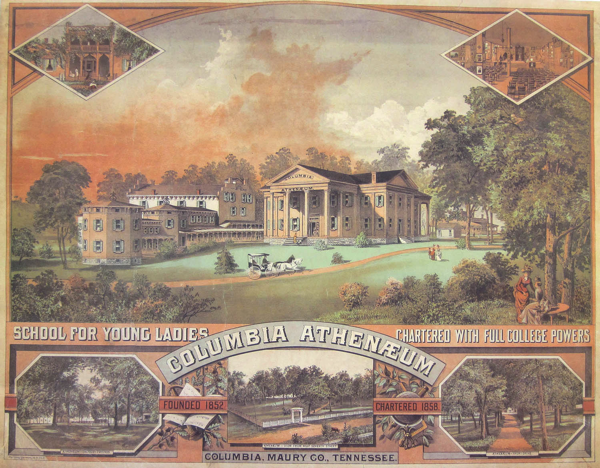
On Wednesday 8 May 1889, the inaugural Congress of the newly-founded Scotch-Irish Society of the United States of America commenced here – today, less than one hour south of Nashville, and half an hour north west of Belfast – in a huge marquee in the gardens which it was said could hold 5000 people. A newspaper report of the time wrote that the marquee might have been formerly used by the evangelist Sam Jones, the preacher who was at that point underway with the founding of the Ryman Auditorium in Nashville, also known as the Union Gospel Tabernacle but best known as the Grand Ole Opry. The Scotch-Irish Congress lasted until the evening of Saturday 11 May.
Columbia Athenaeum had been built in 1837, intended to be the home of Samuel Polk Walker, a relative of President James Polk who was of East Donegal ancestry. By the 1850s it was a ground-breaking girls’ school, run by the Episcopal Church, teaching art, music, history, science and business. It had capacity for 125 boarders, plus day students from the local area. The school complex is gone but the Rectory residence is still there today.
A thousand newspapers advertised the event. When the day arrived the town was jam-packed, the railways bringing people from far and wide - ‘a crowded mass of humanity’. The stage in the tent could seat 50 people, including a portrait of Polk and a ‘Harp of Erin’ which belonged to a Mrs Emma McKinney, the ‘instructress of music’ at the girls’ school which operated from the Athenaeum, and who would play it later that day, accompanied by a Hal P Seavy, Chairman of the Reception Committee, on the violin. Not the fiddle. The violin.
Later on, the personal harp of Thomas Moore put in an appearance, inside a glass case, described as ‘Tom Moore’s Harp’ - which is akin to the awful abbreviation of ‘Bobby Burns’ that you come across now and again. Moore’s harp was loaned by a George W Childs of Philadelphia, who had bought it from Moore’s family. It is now in the collection of the Royal Irish Academy in Dublin - photo here. A poem in honour of the harp, but which tried to tell the story of the Scotch-Irish people, was delivered by the wonderfully-named Wallace Bruce, a writer from New York of some repute.
This occasion wasn’t for the hoi polloi, the people who would later be called “Our Southern Highlanders” (Kephart, 1913) or the “Plain Folk of the Old South” (Owsley, 1949). The event was characterised as being ‘free from all the rougher elements’, it had both ‘great dignity’ and ‘intellectuality’. By the time the band parade made its way through the town to the Athenaeum the crowd was estimated at 6000 – 10,000 people. During the afternoon breaks, the visitors ‘repaired to the fair grounds' where they were entertained by horse racing; others took driving tours of the area - presumably by horse and carriage as the motor car hadn’t yet been invented. Old soldiers of both the Union and Confederate armies compared reminiscences; Princeton College agreed to help collate information for future reference.
The newly inaugurated President Benjamin Harrison sent his apologies, too busy to attend, but appreciative of the invitation he had received. Previous President Grover Cleveland did likewise. Author Henry C McCook was in the same boat, but his reply was lengthy and gushed with ancestral pride - “the very backbone of these commonwealths has been drawn from the heathered hills of Scotland and the green hills of Ulster”.
Emma McKinney later sang this Scots language song –
The puir auld folk at hame, ye mind,
Are frail and failing sair,
And weel I ken they'd miss me, lad,
Gin I cam' hame nae mair
The grist is out, the times are hard,
The kine are only three,
I canna leave the auld folk now,
We'd better bide a wee,
I canna leave the auld folk now,
We'd better bide a wee.When first we told our story, lad,
Their blessing fell sae free,
They gave no thought to self at all,
They did but think of me;
But, laddie, that's a time awa',
And mither's like to dee,
I canna leave the auld folk now,
We'd better bide a wee,
I canna leave the auld folk now,
We'd better bide a wee.I fear me sair, they're failing baith,
For when I sit apart,
They talk o' heaven sae earnestly,
It weel nigh breaks my heart!
So laddie dinna ask me mair,
It surely winna be,
I canna leave the auld folk now,
We'd better bide a wee.
I canna leave the auld folk now,
We'd better bide a wee.
• Visit the Columbia Athenaeum website here. It's easy to imagine the Southern belles in their grandeur, and the wealthy businessmen, passing an afternoon here.






0 comments:
Post a Comment